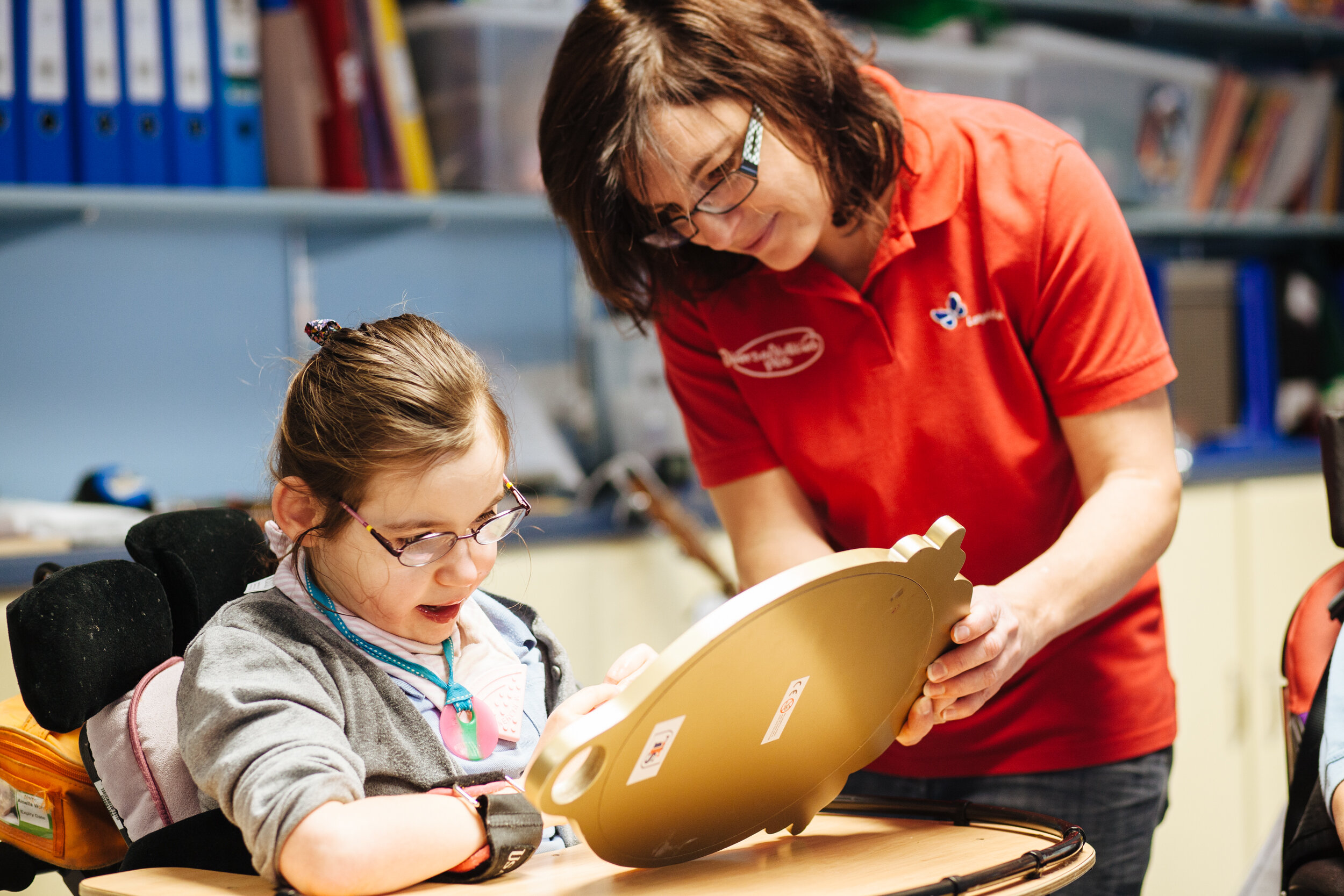
Curriculum information
Supporting pupils with profound and multiple learning difficulties (PMLD)
The official Department for Education (DfE) definition of pupils with PMLD is:
Pupils with profound and multiple learning difficulties have complex learning needs. In addition, pupils have other significant difficulties, such as physical disabilities, sensory impairment, or a severe medical condition. Pupils require a high level of adult support, both for their learning needs and also for their personal care. They are likely to need sensory stimulation and a curriculum broken down into very small steps. Their attainments are likely to remaining in the early P scale range (P1 – P4) throughout their school.
Introduction
Langside is a Non-maintained Independent Special School for pupils aged 2 to 19 years with PMLD (Profound and Multiple Learning Difficulties) and complex medical needs.
Langside can support up to 32 children who have an EHCP (Education and Health Care Plan) and provides a caring environment alongside one which will stimulate and challenge every pupil. The school provides a fully integrated sensory and therapeutic approach to education; each pupil has an individually tailored curriculum which focuses on personalised approaches to learning. This ensures pupils are motivated to learn and will enable them to develop their personality, self confidence and ultimately enable them to become as independent as possible, in preparation for the time when they will leave school.
Skip ahead?
Select one of the options below to skip ahead to the relevant section.

ImPACTS assessment and curriculum model
ImPACTs is an assessment tool and curriculum that has been developed to ensure the pupil is at the centre of the assessment and planning process. It provides target setting information to improve individual learning as well as the potential for whole-school improvement.
The ImPACTS programme offers Langside pupils a specialised curriculum in four Key Skill Areas: Communication, Cognition, Environmental Control Technology and Personal Social and Emotional Well Being.
The curriculum is delivered in a wholly integrated manner, incorporating learning, therapy and health needs with input from the multidisciplinary team, parents and carers to enhance the content, accuracy of the assessments and curriculum delivery and to ensure we meet their individual needs.
Assessment is a continuous process and forms a fundamental part of creating a bespoke curriculum for our pupils while highlighting an individual’s progress through termly assessment (Progress to Attainment).
The personalised approach to our curriculum means pupils experience a variety of approaches to learning; breadth & balance, quality interactions, stimulating experiences, promotion of independence, at the same time as nurturing their natural curiosity and positive engagement with the world around them
Aims of the curriculum
To provide an appropriate and stimulating education for pupils who have PMLD.
To provide an effective learning environment where, through assessment, a detailed and shared understanding of a pupil's needs is known by all those supporting them.
To provide a highly responsive environment where Inclusive Communication is evident and every pupil's ability to communicate is respected, responded to and developed.
To provide a range of consistent routines and meaningful activities to enable pupils to develop awareness, control, and independence within their learning environment.
To provide exciting learning opportunities through broad range of experiences and activities.
Breadth, Balance, and Inclusion
At Langside, we aim to provide a broad and balanced curriculum that is stimulating, enriching and fulfilling. We strive to meet the needs of the ’whole’ child and promote good communication skills and independence.
Our multi-disciplinary team ensures pupils are able to access learning across a wide range of activities, as fully as possible, promoting positive risk-taking and engagement.
We support individualised learning programmes and value self-expression, choice making and inclusion in community experiences.
Topics are used to incorporate and focus within key skill areas.
Outings are arranged to support a multi-sensory experience.
Enrichment weeks focus on one of the curriculum key skill areas; specialists are invited in to bring new experiences and opportunities for learning, to the pupils e.g., Sensory Theatre companies, Dance teachers and Musicians.
Creative elements of our curriculum include Dance, Drama, Art and Craft activities, Cooking and Music.
The OPTIONS class take part in The OPT Award, developed by Langside School, specifically designed for students with SEND replacing our previous accredited Duke of Edinburgh Award. The pupils have attended residential holidays in order to experience outdoor pursuits such as abseiling, zip wire and tree top trails.
Langside promotes British values and recognises festivals from different cultures throughout the year. We hold services of worship marking Christian festivals at our local church and meet at the end of each week for a whole school assembly to celebrate individual achievements.
Langside strives to make events inclusive. Parents and visitors are invited to attend services as well as our school concerts.
Langside takes part in fund raising events to support other charities and organisations.
Inclusion is a priority at Langside. It provides opportunities for our pupils to engage in community events and work with children across a broad spectrum of age and ability. Lower school meets regularly with other SEND Early Years providers for joint sessions and upper school meets with pupils from mainstream and other special schools and as part of the Transition Process have regular visits out into the community.
Using ImPACTS
In order to provide an educational environment which is most appropriate we recognise children, young people and adults with PMLD have unique abilities and ways of learning.
ImPACTS is an assessment tool and curriculum that supports and develops pupils’ strengths and abilities and focusses on developing the learners’ understanding of the world around them, and of social interactions and relationships. ImPACTS allows us to ensure the pupil is at the centre of the assessment and planning process. It provides target setting information to support individual learning as well as the potential for whole school improvement through regular moderation.
Assessment questions
Assessment is a continuous process and forms a fundamental part of the process of creating a bespoke curriculum. Assessment is intrinsic to the curriculum, enabling professionals from education and therapy to design exciting and effective learning environments for our pupils, supporting them to make progress.
On completion of the assessment, each pupil's score is translated onto a ‘profile’, which creates an overview of strengths, weaknesses and development points. Once the profile has been completed, staff refer to the Curriculum document for developmentally appropriate objectives, activities and resources. The Curriculum document gives suggestions and is not designed to be prescriptive. This leaves scope to develop activities and resources that reflect the highly individualised needs of pupils and their motivations. A number of short-term targets will be determined based on a pupil’s Longer-Term Outcomes from their EHCP, the ImPACTS Assessment and their individual needs.
ImPACTS curriculum guidance
On completion of the assessment, each pupil’s score is translated onto a profile, which creates and overview of strengths, weaknesses, and development points. Once the profile has been completed, staff refer to the curriculum document for developmentally appropriate objectives, activities, and resources. The curriculum document gives suggestions and is not designed to be prescriptive. This leaves scope to develop activities and resources that reflect the highly individualised needs of pupils.
Target setting
Targets are set by the multi-disciplinary team and shared with parents who are encouraged to give feedback, ensuring that they understand them and can continue with them at home where appropriate. Targets form part of the personalised learning programme for the pupil and activities should take account of the preferences, motivators, and interests of the learner and be respectful of their developmental level/age.
Progress towards achieving targets is monitored daily and targets are reviewed at least twice a year (more frequently if needed). When a child achieves a target earlier than expected, parents are informed of this and a new target is set. When a child does not achieve a target in the expected time, a discussion takes place as to the benefit of continuing with a target, and to what might be preventing the child from achieving the target.
Progress through the school
Langside School has 5 classes which are organised in age bands.
Each class is supported by a combination of highly skilled/qualified education and therapy staff.
Little Acorns has the youngest pupils as part of the Early Years.
Caterpillar and Cocoons Classes have pupils in Key Stages 1 and 2.
Butterflies Class supports pupils in Key Stages 2 and 3.
OPTIONS has pupils in Key Stages 4 and 5.
Langside is the lead centre for the OPT Award, replacing Duke of Edinburgh scheme; pupils work towards this accreditation from the age of 16. This enables the curriculum to be broadened and enriched with arts and physical activities and encourages pupils to interact with the community and hence prepare further for transition.
Transition is a key element and focus for older pupils in the OPTIONS Class. Teachers and staff work closely with parents to help find suitable placements for the start of adult lives and to work alongside newly appointed support teams to pass on all relevant information.
